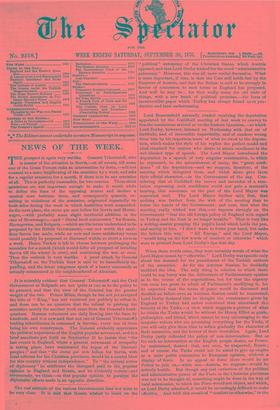It is tolerably evident that General Tchernaieff and the Civil
Government at Belgrade are not quite at one as to the policy to be pursued, and that the view of the -General has the greater• weight of the two. Prince Milan, though he has not yet accepted the title of "King," has not ventured yet publicly to refuse it, and there can be no question that the refusal to prolong the armistice merely for another week came from the General's head- quarters. Russian volunteers are daily flowing into the lines by hundreds, and it is now said that not one of General Tchernaieff's leading subordinates in command is Servian, every one of them being his own countrymen. The General evidently appreciates the political importance of the English popular movement, and in a brief manifesto put forth on September 25 he insists that "the last events in England, where a general movement of sympathy is taking place, have reanimated the hopes of the Slavonic peoples ;" and that "the status quo ante bellum for Servia, with local reforms for the Christian provinces, would be a mortal blow for this country without independence." To "the selvent action -of diplomacy" he attributes the disregard paid to the, popular opinion in England and Russia, and he evidently counts—not erroneously, we think—on that popular opinion to paralyse the diplomatic efforts made in an opposite direction.


































